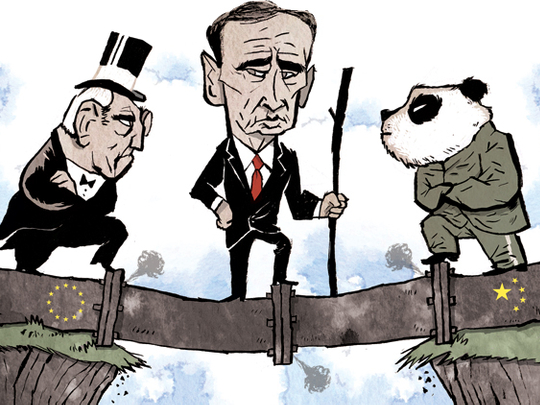
Russia’s intervention in east Ukraine is clearly wrong and Ukraine’s friends in the European Union (EU) and across the Atlantic have been very foolish not to do far more to make it clear to Russia that further annexation of territory will not be tolerated. But it is also important that Europe and Nato abandon their policies of treating Russia as either a dangerous enemy or as a failed state of no consequence. Neither case is true and neither case makes any allowances for Russia’s genuine concerns. Unless the EU wakes up to the fact that it shares a continent with Russia, no policy will succeed.
Europe and Washington need to recognise that in the immediate aftermath of the collapse of the Soviet Union, both the EU (social and economic) and Nato (military) quickly expanded east, in a blatant threat to Moscow which at the same time also saw its position in Central Asia collapsing. Xie Tao of Beijing Foreign Studies University, writing in the current issue of the influential Korean journal Global Asia, comments on how China has made serious inroads into the Central Asian republics that were Russia’s private territory in the days of the USSR. Chinese trade with Kazakhstan, Kyrgyzstan, Tajikistan, Turkmenistan and Uzbekistan has grown 100 times from $467 million (Dh1.17 billion) in 1992 to $45.9 billion in 2012 as insatiable Chinese demand for oil and gas has driven them to build a new network of pipelines and supply lines.
Russia was a major supplier of weapons technology to China, but has just decided to reduce this. Bilateral negotiations over gas prices have been stalled for many years as another sign of Russian uneasiness with the growing economic giant impinging on its space.
Tao points out that, additionally on the security front, China has set up the Shanghai Cooperation Organisation, which includes the five Central Asian states plus five other observer states, to fight the threat of terror which from the Chinese perspective is focused on Uighur activists and other Muslim radicals hoping to destabilise the vast Chinese province of Xinjiang with its large Turkic population.
All this Chinese activity in Central Asia is profoundly worrying to Moscow as it seeks to preserve what little direct influence it can having lost all of Central Europe. Vladimir Putin sees Russia as losing on all fronts to outside forces, destroying its historic legacy.
Nato’s blunder
George Keenan was the US diplomat who wrote the famous ‘long telegram’ in 1946 and the subsequent ‘X’ Article that set out the strategic vision that defined US policy towards the USSR during the Cold War. He was the architect of the policy that described how the two former allies could not remain friends, yet did not have to go to war. Keenan was vehemently against president Bill Clinton’s invitation in 1997 to expand Nato to include Poland, Hungary and the Czech Republic. He described Clinton’s support for this proposal as a “strategic blunder of potentially epic proportions”. And a few days later, he expanded his thoughts in the New York Times, describing the expansion of Nato as “the most fateful error of American policy in the entire post-Cold War era”.
When Clinton read these views, he checked with his deputy secretary of state, Strobe Talbott, who replied that the Russians would go along with the expansion, regardless of what Keenan might predict. Subsequent events have proved how wrong Talbott was, but only after Nato’s startlingly rapid expansion.
Poland, Hungary and the Czech Republic joined Nato in 1999, followed by seven countries from Central Europe and the Baltic in 2004, and then Albania and Croatia in 2009. President George Bush senior was actively courting membership for Ukraine and Georgia at the same time, although they backed off under Russian pressure and Russia supported the secession of Abkhazia and South Ossetia to punish the Georgians for their temerity in looking West. And today, Ukraine is being made to pay the penalty. It has already lost Crimea and the government’s authority in eastern Ukraine is being challenged. President Oleksandr Turchynov can say what he likes, but there has been no concerted government action to take back its authority. In fact, the region’s police appear to have defected en masse to the pro-Russian side and Russian flags and those of the self-proclaimed Donetsk Republic are flying on the barricades and public buildings. Russian annexation is creeping closer and closer.
And Putin does not want to stop there. He is looking further West. IHS Energy has reported that Putin sent a letter to 18 European countries that import Russian gas, warning that Russia will disrupt gas exports to Europe if the dispute between Russia and Ukraine continues.
One important response that the EU should prepare to the threat of a ‘gas war’ is to help Ukraine pay at least part of its debts of $2.2 billion in overdue bills, $18 billion in fines and another $17 billon in aggregated price discounts dating to 2009, which Russia is now claiming are not valid. It is good that the EU is working with the World Bank and the International Monetary Fund to enable Ukraine to pay its overdue gas bills through a financial aid package, but if it is to have any effect, it needs to happen immediately and may well be combined with more muscular activity on the ground to restrain any Russian forces.
See also Editorial comment — A2 & A5








